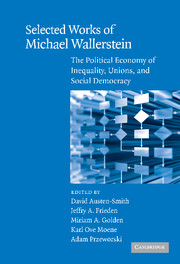 Selected Works of Michael Wallerstein
Selected Works of Michael Wallerstein Published online by Cambridge University Press: 27 January 2010
Introduction
During recent years extensive research has centered on corporatist patterns of interest representation and centralized systems of collective bargaining. This research has associated corporatism and centralized bargaining with “labor quiescence,” to use David Cameron's (1984) label for the combination of low strike rates and wage restraint. Labor quiescence, in turn, is claimed to contribute to successful economic performance: lower rates of inflation and unemployment, higher rates of investment, and a less pronounced slowdown of growth following the oil crises of the 1970s.
Union cooperation with government policies to curb the growth of wages has been a central theme in the research on corporatism in Western Europe. In one of the first contributions to a burgeoning literature, Gerhard Lehmbruch (1977) observed: “Incomes policies appear to constitute a core domain of liberal corporatism” (96). Similarly, Leo Panitch (1977) argued that in “virtually every” corporatist society, policies “designed to abate the wage pressure of trade unions was the frontpiece of corporatist development” (74). Cross-national studies by Bruce Headey (1970) and Gary Marks (1986) have verified the existence of a close empirical relationship between union centralization and the successful implementation of voluntary incomes policies.
More recently, union centralization or corporatism has attracted the attention of economists seeking to account for the divergence in macroeconomic performance among advanced industrial societies since the mid-1970s.
To save this book to your Kindle, first ensure [email protected] is added to your Approved Personal Document E-mail List under your Personal Document Settings on the Manage Your Content and Devices page of your Amazon account. Then enter the ‘name’ part of your Kindle email address below. Find out more about saving to your Kindle.
Note you can select to save to either the @free.kindle.com or @kindle.com variations. ‘@free.kindle.com’ emails are free but can only be saved to your device when it is connected to wi-fi. ‘@kindle.com’ emails can be delivered even when you are not connected to wi-fi, but note that service fees apply.
Find out more about the Kindle Personal Document Service.
To save content items to your account, please confirm that you agree to abide by our usage policies. If this is the first time you use this feature, you will be asked to authorise Cambridge Core to connect with your account. Find out more about saving content to Dropbox.
To save content items to your account, please confirm that you agree to abide by our usage policies. If this is the first time you use this feature, you will be asked to authorise Cambridge Core to connect with your account. Find out more about saving content to Google Drive.